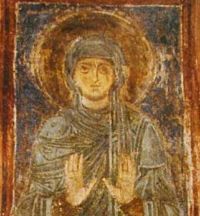107 - Practice Makes Perfect: Christian Asceticism
Christian ascetics like Antony, Macrina and Evagrius create a new ethical ideal by pushing the human capacity for self-control to its limits.
Themes:
• A.M. Casiday, Evagrius Ponticus (London: 2006).
• E.A. Clark, Ascetic Piety and Women’s Faith: Essays in Late Ancient Christianity (Lewiston, NY: 1986).
• S.K. Elm, “Virgins of God”: The Making of Asceticism in Late Antiquity (Oxford: 1994).
• G. Clark, Body and Gender, Soul and Reason in Late Antiquity (Farnham: 2011).
• W. Harmless, Desert Christians: an Introduction to the Literature of Early Monasticism (Oxford, 2004).
• H. Hunt, Clothed in the Body: Asceticism, the Body and the Spiritual in the Late Antique Era (Farnham: 2012).
• J. Kalvesmaki and R.D. Young (eds), Evagrius and his Legacy (Notre Dame: 2016).
• R.W. Sharples and P.J. van der Eijk, Nemesius: On the Nature of Man (Liverpool: 2008).







Comments
Hi Peter You still have a
Hi Peter
You still have a sense of humour . Ascerticism at Christmas mmm. But I do hope that Santa puts one marshmellow in my Christmas sock for who knows whether I will be here next year to have two. By that time my desire for marshmellows may have diminished and the pleasere of eating two would not outweight the pleasure of eating one this Christmas.
Roman
In reply to Hi Peter You still have a by Roman Prychidko
Greek fathers for Christmas
I know, I was thinking that was ironic too. But actually the real "Christmas episode" will be next week's interview with George Boys-Stones, and I hope that will make a good stocking stuffer.
Peter
bibliography
Hi Peter, I would suggest as additions to your bibliography these two classics: Hadot's _Philosophy as a Way of Life_ and Brown's _The Body and Society: Men, Women, and Sexual Renunciation in Early Christianity_. My apologies if you have cited these in one of your earlier podcasts; I got up to the later Plato ones and have skipped ahead temporarily to the Christianity ones, but plan to go back to cover the missed ground.
Keep up the great work!
Nick
In reply to bibliography by Nicholas Marinides
Brown and Hadot
Thanks, good suggestions. I added Brown for this episode. I'm not sure where to add Hadot actually, he could go on many of the bibliographies... maybe the general one for Late Antiquity?
In reply to Brown and Hadot by Peter Adamson
where to place Hadot
I think probably in the one introducing the Hellenistic Schools (Podcast #52), which I just listened to yesterday (I am catching up with the older podcasts while also trying to keep up with the new ones).
Methodius' Symposium or On Virginity
Dear Peter:
I'm enjoying your podcasts very much, which are helping to fill the many gaps in my knowledge of the history of philosophy. (I'm not listening to them in order, but am skipping around quite a bit.)
I hope this doesn't come across as my obnoxiously pointing out of a gap in your history of philosophy without any gaps: it's certainly not meant that way. I simply want to recommend an early Christian work (not as containing the truth, but as being representative of asceticism in the realm of sex), if you weren't aware of it. I sometimes teach a course on ancient Greek and early Christian conceptions of love (especially eros), and I begin with the Homeric Hymn to Aphrodite, Plato's Symposium is the centerpiece, and I end with St. Paul's 1 Corinthians 7 and Methodius' Symposium (or On Virginity). It's this last work I wanted to bring to your attention, if you weren't aware of it. Methodius of Olympus (died early 4th c.) wrote a work modelled on Plato's Symposium, but instead of a group of men discussing eros, it's a group of virgins (brides of Christ) discussing virginity (and debating its value in contast to a married life). It's quite extreme (like Jerome's Letter 22), and my students (many of whom are Christian, as I teach at a Catholic University) find it quite shocking, not to say disturbing. Anyway, I think it's an interesting ascetic work, and it counts as philosophical in the way you stipulate that as applied to religious figures. (Of course, if you know this work, please disregard the above--except for the opening sentence.)
Thanks, and best wishes,
Robert
In reply to Methodius' Symposium or On Virginity by Robert Mayhew
Methodius
Thanks, that sounds very interesting! I don't know the text so I'm grateful for the reference. Unfortunately I have already finished off the book version of these episodes on later ancient philosophy (it's in press now) so I can't add it to the chapter based of this episode. But I agree it sounds like part of the story I am telling here.
Glad you are enjoying the series!
The marshmallow test has…
The marshmallow test has fallen on hard times since this episode came out. It turns out your ability to not eat a marshmallow as a child doesn't really mean much. There is a slight correlation between not eating the marshmallow and academic performance, but this disappears if you control for factors relating to home environment. Maybe the rich kids have marshmallows at home, maybe the kids with shaky family lives are less likely to trust the adult running the test, maybe the poor kids are used to living hand to mouth and aren't concerned with theoretical future marshmallows. Anyways, will doesn't really enter into it. If you want to be successful, have supportive parents. Preferably rich ones. I wonder if the Desert Father's would have enjoyed their poverty so much if they had to work minimum wage jobs all day instead of praying while people fetched them food?
In reply to The marshmallow test has… by Dylan
Marshmallows provide soft results
That's a shame, it's such a good story. Like lots of psychological experiments that didn't replicate or fall apart on closer inspection. Thank goodness philosophy is non-empirical, right?
In reply to Marshmallows provide soft results by Peter Adamson
I have to admire your…
I have to admire your commitment to placing puns, not only in the episode titles, but in the titles of your comments as well. You are clearly not an Epicurean. They, as you know, believe that the greatest pleasure is the simple absence of pun.
In reply to I have to admire your… by Dylan
Wordplay
And for Plotinus too, beyond Soul and Intellect there is only the Pun.
In reply to Wordplay by Peter Adamson
Yes of course. Though the…
Yes of course. Though the neoplatonists were always a bit too fond of puntificating on the nature of punness for my taste.
Nietzsche
Just plowing through this excellent series and couldn't help but chuckle when you guestimated that you'd be discussing Nietszche a few hundred episodes from here (ep. 107). As it turns out, Ep. 408 is the Huguenots so looks like there were more gaps than anticipated that needed to be filled. Keep it up!
In reply to Nietzsche by Brian
Miscalculation
Well I was almost right, in that Nietzsche and Huguenot are both difficult to spell correctly.
Add new comment